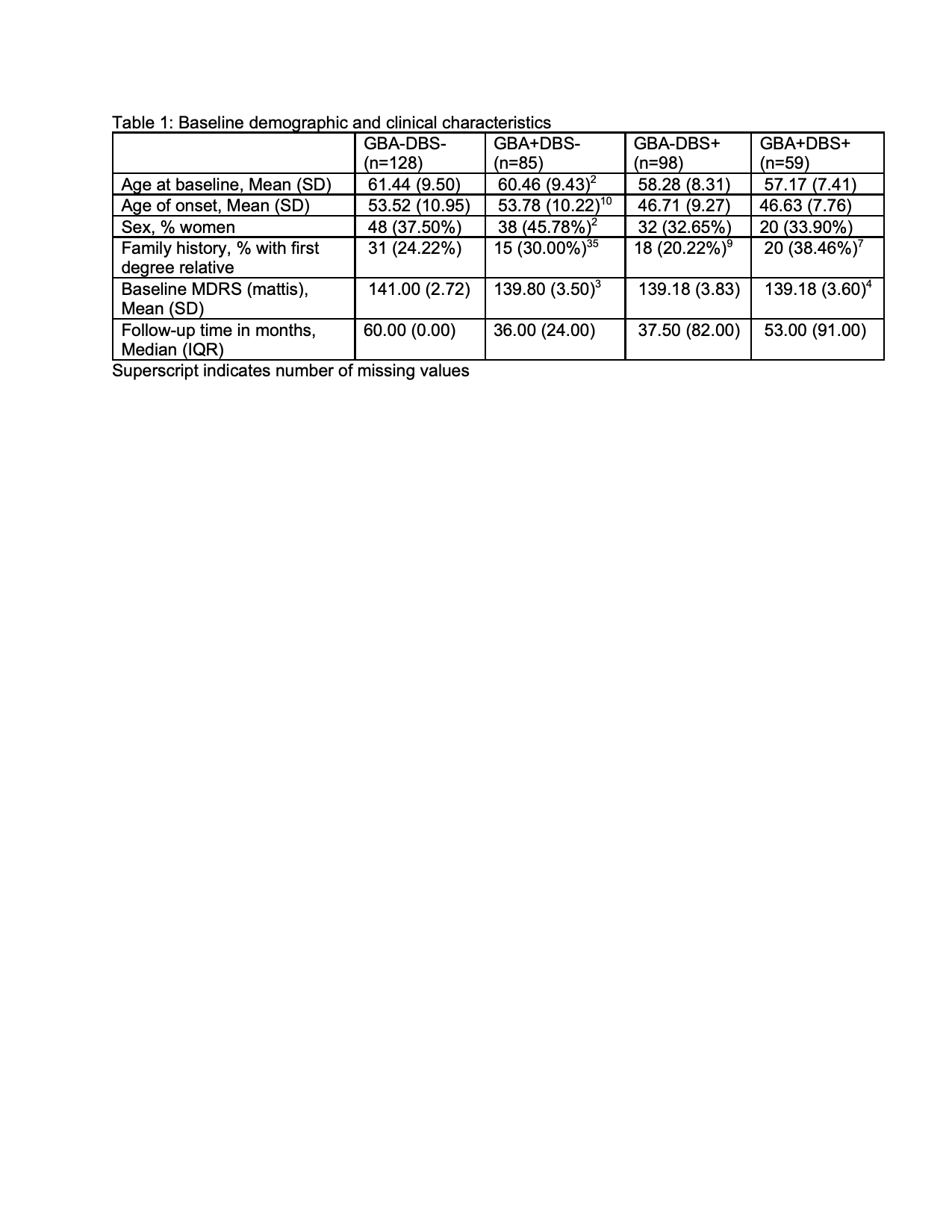Category: Surgical Therapy: Parkinson's Disease
Objective: To compare the rate of change in cognition between glucocerebrosidase (GBA) mutation carriers and non-carriers with and without subthalamic nucleus deep brain stimulation (STN-DBS) in Parkinson’s disease (PD).
Background: GBA mutation carriers with PD are at risk for faster cognitive decline compared with non-carriers. Some studies have suggested that STN-DBS is also associated with cognitive decline. The interaction between GBA and STN-DBS has not been examined.
Method: Data were pooled from University of Amsterdam, Columbia University, Hôpital Pitié-Salpêtrière, NIH, Norwegian University of Science and Technology, PPMI, Rush University, Mount Sinai Beth Israel, University College London, LRR2K Cohort Consortium, STEADY-PD, and the PD Biomarkers Program. We collected: age, age at disease onset, sex, date of DBS, family history, UPDRS/MDS-UPDRS, MMSE, MoCA, and Mattis Dementia Rating Scale (MDRS). MMSE and MoCA scores were converted to MDRS scores (1). Only subjects with a baseline MDRS score of >=130 were included. Subjects were examined for GBA mutations and then categorized as GBA carriers with or without DBS (GBA+DBS+, GBA+DBS-), and non-carriers with or without DBS (GBA-DBS+, GBA-DBS-). GBA mutation carriers were further subcategorized according to mutation severity (risk variant, mild, severe). Subjects who carried both GBA and LRRK2 mutations were excluded. Linear mixed modeling was used to compare rate of change in MDRS scores over time among the groups according to GBA and DBS status and then according to GBA severity and DBS status. The model was adjusted for age, age at onset, sex, and study site (random factor).
Results: Data were available for 59 GBA+DBS+, 85 GBA+DBS-, 98 GBA-DBS+, and 128 GBA-DBS- subjects (Table 1). MDRS scores worsened fastest in GBA+DBS+ compared with the other three groups (Table 2). GBA+DBS+ with either risk variant, mild, or severe mutations declined faster than GBA+DBS- with similar mutation severity (Table 3).
Conclusion: This study suggests that there is an interaction between GBA mutations and STN-DBS that negatively impacts cognition. Regardless of mutation severity category, GBA mutation carriers declined cognitively more after DBS than those without DBS. Genetic screening for GBA mutation status should be part of the DBS pre-operative evaluation. Whether pallidal DBS would lead to better cognitive outcomes than STN-DBS remains unknown.
References: 1. van Steenoven I, Aarsland D, Hurtig H, et al. Conversion between mini-mental state examination, montreal cognitive assessment, and dementia rating scale-2 scores in Parkinson’s disease. Mov Disord. 2014;29(14):1809-1815.
To cite this abstract in AMA style:
G. Pal, G. Mangone, E. Hill, V. Lythe, D. Ehrlich, R. Saunders-Pullman, V. Shanker, S. Bressman, R. Alcalay, P. Garcia, K. Marder, J. Aasly, M. Mouradian, B. Ouyang, Y. Liu, S. Ruehl, M. Rosenbaum, S. Anderson, B. Bernard, D. Hall, S. Sani, L. Verhagen, R. Debie, T. Foltynie, J. Corvol, C. Goetz. Combined effects of GBA mutations and STN-DBS negatively impact cognition in Parkinson’s disease [abstract]. Mov Disord. 2021; 36 (suppl 1). https://www.mdsabstracts.org/abstract/combined-effects-of-gba-mutations-and-stn-dbs-negatively-impact-cognition-in-parkinsons-disease/. Accessed December 20, 2025.« Back to MDS Virtual Congress 2021
MDS Abstracts - https://www.mdsabstracts.org/abstract/combined-effects-of-gba-mutations-and-stn-dbs-negatively-impact-cognition-in-parkinsons-disease/



